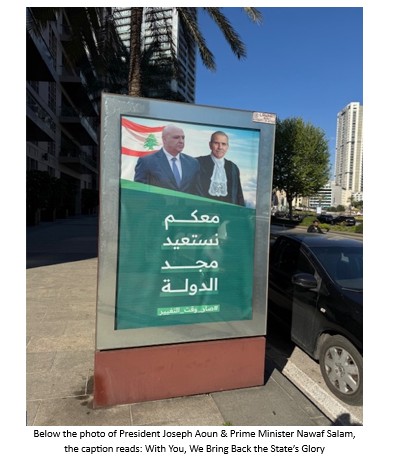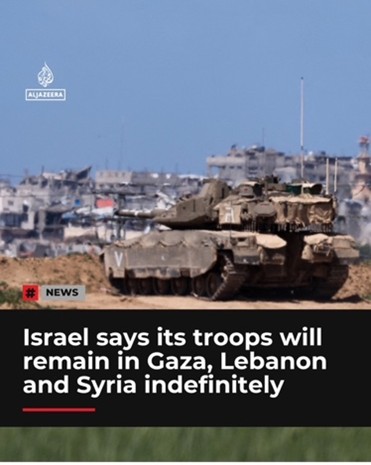What Do We Really Want?
You’re looking at Beirut’s sea as I captured it last Sunday on my early morning walk. The laps I could have had in those waters had we had the sense to keep them pristine.
I’ve noticed it across the years. A desperate moment, a rupture, a new patch-up, half-written, half-agreed, a new president and cabinet, a loud sigh of relief.
In the very early days of peace after the 15-year Lebanese civil war–– the Haririan era, we call it –– you couldn’t really tell: was all the pomp and ceremony meant to trumpet the magnificent achievements or cover for their absence? It didn’t take very long to have our answer, whichever side of the Haririan fence we stood. The argument was (and remains) only about who’s to blame.
It has to be said, though, that so the case has been from inception in 1943 to this Spring. After every small quarrel or major war, a quick restitching, a shaking of the collective self, a prayer, a lull, a party. It only takes a journey down the pages of al-Anwar, al-Hayat, and Annahar, the major newspapers of yesteryear, to get a sense of William Faulkner’s words: “The Past is not dead. It’s not even past.”
I’ve long detected, however, a gradual change in temperament since the so-called post-war peace: the greater our needs grew, the smaller our dreams became. We went from boasting that we will retrieve for Lebanon its old sheen as the Switzerland of the Middle East and outmatch Dubai, to could we have some electricity, please. At the heart of this boast, especially on the part of the ruling class, was the belief that all the Lebanese system required is a little tightening. This pragmatism of old, which helped beget the civil war, had essentially stayed. It wasn’t so much the modesty of those without agency for serious reforms, but those who were not keen on them in the first place.
But this new brand of pragmatism that has gradually taken root after the war is altogether different. It’s ours, across the hierarchies of Lebanese life, who have learned that the will of the system to stay is far greater than our will for it to leave. It’s not blithe contentment with the status quo that feeds it, but despair about it. The tragic irony in all this is that when our challenges in, say, the 1950s and ‘60s, seemed relatively manageable, we argued for small fixes; when we discovered them postwar to be quite daunting and intractable, we were happy to settle for even smaller tweaks.
It seems counter intuitive for a people to ask for very small favors when the want is herculean. And our want as Lebanese truly is immense. In our ambitions, we should be taking our cue from what is sorely missing.
In the presence of eternal war, we would want eternal peace.
In the absence of apparent consensus on existential questions, we would want national referenda to bring us answers.
In the absence of the sovereign state, we would want a strong one to offer a semblance of security and dignity, of order to our existence as well.
In the presence of endemic corruption that has eaten into every fiber of our body politic, we would want an independent judiciary and sweeping laws to usher in decency and accountability as they usher out the ruling mafia’s countless thieves.
In the absence of a preserved land and sea, we would insist on an environmental policy that rehabilitates them…

Instead, we find ourselves asking for the killing to stop if only for a while to count the loved ones still alive, to gauge the toll on our sanity, and to make enough money to escape the costs of the next round. We plead with our municipalities not to allow the garbage to pile up. We travel to the extreme north or south in search of a beachfront deceptively clean enough to splash in. We are impressed that the electricity is coming five to six hours a day instead of the two we have been conditioned to live by. We begrudgingly accept the petty bribes to the petty officials threatening to make our life miserable, but we request at least for the bureaucratic paperwork to run more efficiently.
We stand today at yet another critical turning point. We just had a crippling war. Hezbollah has been hit very hard. Geopolitical trends are very prickly. Israel still occupies five locations in the south. Its drones still buzz in our skies, its missiles still kill people and explode buildings and living rooms. The overall damage, according to the world Bank, runs over $20 billion. Our banking sector is in ruins, the state is broke, we produce very little and import practically everything. What independent journalism we have is under attack by the reigning cabal. Our consociational democracy is a scandal of a prototype. And what do we want?
In this darkness, a flicker of light!

Such a meek request doesn’t reverse decades of failure, nor does it suggest any momentum remotely sustainable. But ironically it does offer the new prime minister, Nawaf Salam, and his cabinet, many of whom are quite capable, all the space they need to effect the modest reforms that would palpably improve the Lebanese experience.
That, should it transpire, all by itself might encourage larger aspirations yet.
****
On Another Note
True, all is not well in Lebanon. It’s a kind of hell in Israel-Palestine. One could argue, as I often have, the entire Levant is in fact a collection of fires, small and large. But as is very obvious, all is not well in the world. It’s a very peculiar, even frightening, moment, in many ways hard to decipher, let alone read.
In such times, I always look for the sages that might trace for me the way of the winds. Robert Harrison is one such thinker. He writes from California, a world away. But often times I am finding that, in what keeps us awake at night, we are neighbors.
In his February 20 podcast, he “performs a cover’ of Walter Benjamin’s essay…’The Destructive Character,’ authored in 1931. A German-Jewish philosopher writing about a German moment close to a century ago. Harrison begins thus:
It could occur to someone, looking back over the debris of history, that many of the calamities befalling peoples and nations originated in persons who had the traits of a destructive character. He would stumble on this fact one day, perhaps by chance, and the heavier the shock dealt to him, the better his chances of representing the destructive character of his own time.
Have a listen!
